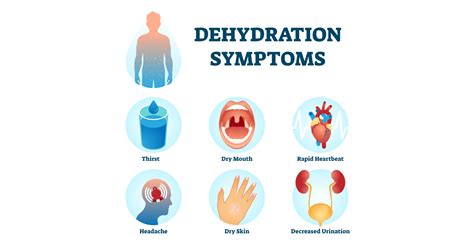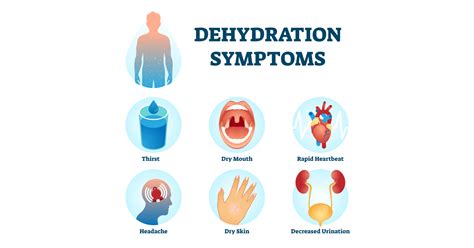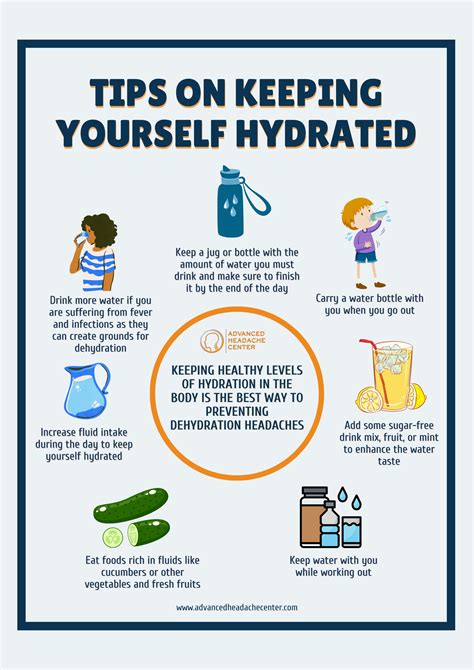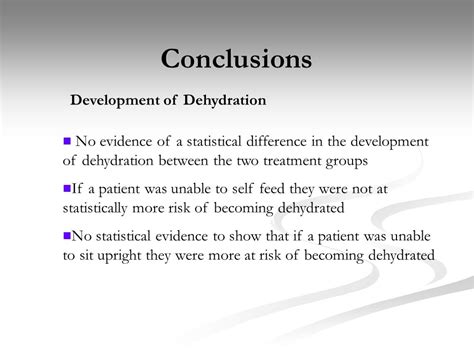Intro
Identify 7 signs of dehydration, including fatigue, headaches, and dry skin. Learn symptoms, causes, and effects of water deficiency, and discover how to prevent dehydration with proper hydration techniques and electrolyte balance.
Dehydration is a common yet often overlooked condition that can have serious consequences on our overall health and well-being. It occurs when our body loses more fluids than it takes in, causing an imbalance in the amount of water and electrolytes in our system. This can happen for a variety of reasons, such as not drinking enough water, excessive sweating, or experiencing vomiting and diarrhea. Dehydration can affect anyone, regardless of age or health status, and it's essential to recognize the signs and symptoms to take prompt action.
Dehydration can range from mild to severe, and its effects can be felt in various parts of the body. Even mild dehydration can cause symptoms such as fatigue, headaches, and difficulty concentrating, while severe dehydration can lead to life-threatening complications like organ failure and even death. It's crucial to stay hydrated, especially during hot weather, intense physical activity, or when experiencing illnesses that cause fluid loss. By understanding the signs and symptoms of dehydration, we can take steps to prevent it and ensure our bodies function properly.
The importance of staying hydrated cannot be overstated. Water is essential for many bodily functions, including regulating body temperature, transporting nutrients and oxygen to cells, and removing waste products. When we're dehydrated, our body's ability to perform these functions is impaired, leading to a range of problems. Furthermore, dehydration can exacerbate existing health conditions, such as kidney stones, urinary tract infections, and heart disease. By recognizing the signs of dehydration and taking steps to address it, we can maintain our overall health and reduce the risk of developing more severe health problems.
Introduction to Dehydration

Causes of Dehydration
Dehydration can be caused by a range of factors, including: * Inadequate fluid intake * Excessive sweating * Vomiting and diarrhea * Certain medical conditions, such as diabetes and kidney disease * Medications, such as diuretics and laxatives * Climate and environment, such as hot weather and high altitudeSigns and Symptoms of Dehydration

Severe dehydration can cause more serious symptoms, including:
- Rapid heartbeat
- Low blood pressure
- Sunken eyes
- Decreased skin elasticity
- Confusion and disorientation
- Seizures and coma
Consequences of Dehydration
Dehydration can have serious consequences on our overall health and well-being. If left untreated, dehydration can lead to: * Kidney damage and failure * Heart problems, such as decreased blood volume and cardiac arrest * Heat stroke and heat exhaustion * Seizures and coma * DeathPrevention and Treatment of Dehydration

Treating dehydration depends on the severity of the condition. Mild dehydration can be treated by drinking plenty of fluids and resting. Severe dehydration requires medical attention and may involve intravenous fluids and electrolyte replacement.
Home Remedies for Dehydration
Here are some home remedies to help treat dehydration: * Drink coconut water or sports drinks to replace electrolytes * Eat foods high in water content, such as watermelon and cucumbers * Avoid caffeinated and carbonated drinks * Take regular breaks to rest and rehydrate * Use a humidifier to add moisture to the airConclusion and Next Steps

We invite you to share your thoughts and experiences with dehydration in the comments below. Have you or someone you know experienced dehydration? What steps do you take to stay hydrated? Share your tips and advice with our community.
What are the main causes of dehydration?
+Dehydration can be caused by inadequate fluid intake, excessive sweating, vomiting, diarrhea, and certain medical conditions.
What are the symptoms of mild dehydration?
+The symptoms of mild dehydration include dry mouth and throat, fatigue and weakness, headaches, dizziness and lightheadedness, dark yellow or brown urine, and decreased urine output.
How can I prevent dehydration?
+To prevent dehydration, drink plenty of water and other fluids, avoid excessive sweating and heat exposure, eat foods high in water content, avoid caffeinated and carbonated drinks, and monitor urine output and color.
